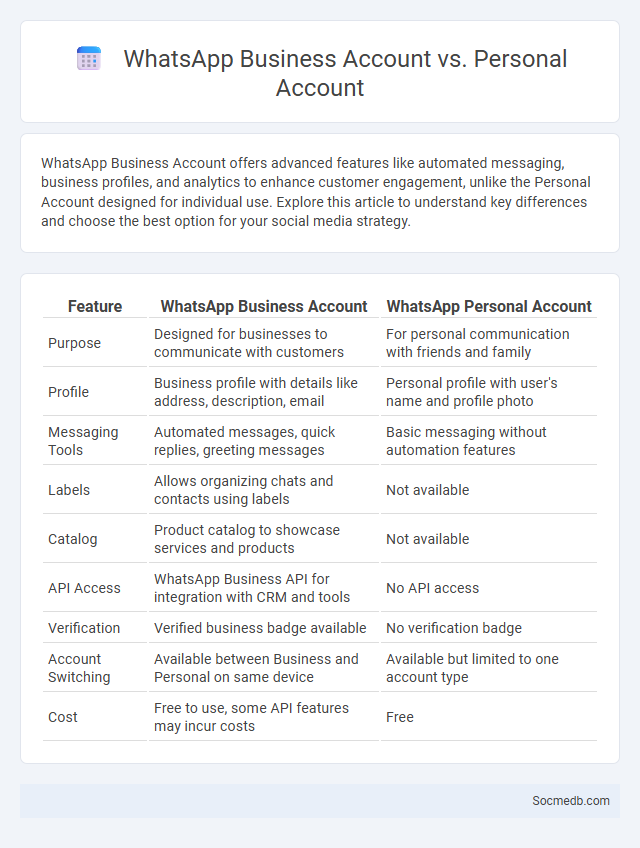
Photo illustration: WhatsApp Business Account vs Personal Account
WhatsApp Business Account offers advanced features like automated messaging, business profiles, and analytics to enhance customer engagement, unlike the Personal Account designed for individual use. Explore this article to understand key differences and choose the best option for your social media strategy.
Table of Comparison
| Feature | WhatsApp Business Account | WhatsApp Personal Account |
|---|---|---|
| Purpose | Designed for businesses to communicate with customers | For personal communication with friends and family |
| Profile | Business profile with details like address, description, email | Personal profile with user's name and profile photo |
| Messaging Tools | Automated messages, quick replies, greeting messages | Basic messaging without automation features |
| Labels | Allows organizing chats and contacts using labels | Not available |
| Catalog | Product catalog to showcase services and products | Not available |
| API Access | WhatsApp Business API for integration with CRM and tools | No API access |
| Verification | Verified business badge available | No verification badge |
| Account Switching | Available between Business and Personal on same device | Available but limited to one account type |
| Cost | Free to use, some API features may incur costs | Free |
Introduction to WhatsApp Accounts
WhatsApp accounts allow users to send text messages, make voice and video calls, and share multimedia instantly through a secure, encrypted platform used by over 2 billion people worldwide. Each account is tied to a unique phone number, enabling seamless contact synchronization and global connectivity. The app supports features such as group chats, status updates, and end-to-end encryption, enhancing privacy and user engagement.
What is a WhatsApp Personal Account?
A WhatsApp Personal Account is designed for individual users to send messages, make voice and video calls, and share media with friends and family. It operates on a phone number basis, allowing secure end-to-end encryption, status updates, and group chats. Unlike business accounts, it lacks commercial tools but emphasizes private communication and user-friendly interaction.
What is a WhatsApp Business Account?
A WhatsApp Business Account is a specialized profile designed for businesses to connect with customers through the WhatsApp platform. It allows Your company to showcase essential information like business hours, address, and product catalogs while enabling automated messages and quick replies for efficient communication. This tool enhances customer engagement by providing a secure, direct channel ideal for personalized support and marketing.
Key Differences: Personal vs Business Account
Personal social media accounts are tailored for individual use, emphasizing personal connections, sharing everyday moments, and engaging with friends and family, while business accounts prioritize brand promotion, customer engagement, and data analytics to drive marketing strategies. Your business account allows access to tools like targeted advertising, performance insights, and enhanced profile options, which are absent in personal accounts. Unlike personal profiles, business accounts support multi-user management and integration with e-commerce features, optimizing online presence and growth opportunities.
Features Exclusive to WhatsApp Business Accounts
WhatsApp Business accounts offer unique features designed to enhance customer communication, including automated greeting messages, quick replies, and away messages that streamline interactions. You can organize chats and contacts with labels for efficient management and use the catalog feature to showcase products or services directly within the app. Access to detailed messaging statistics and integration with Facebook Shops further supports business growth and customer engagement on WhatsApp.
Use Cases: Personal vs Business
Social media platforms serve distinct use cases for personal and business purposes, with personal use focusing on social connection, self-expression, and entertainment, while businesses leverage these channels for brand awareness, customer engagement, and targeted marketing campaigns. Your business can benefit from analytics tools and advertising options available on platforms like Facebook, Instagram, and LinkedIn to optimize reach and conversions. Effective social media strategies tailor content to the specific goals of either individual users or commercial objectives, maximizing impact and return on investment.
WhatsApp Business Account: Pros and Cons
A WhatsApp Business Account enhances your customer communication by providing automated messages, quick replies, and detailed business profiles that increase accessibility and brand trust. However, limitations include restricted reach compared to other platforms, dependency on mobile devices, and potential privacy concerns for users sharing data through the app. You can leverage WhatsApp Business to streamline interactions, but balancing its pros and cons ensures optimal effectiveness for your marketing strategy.
Security and Privacy Comparison
Social media platforms vary significantly in security measures and privacy protections, with some employing end-to-end encryption and stringent data access controls, while others collect extensive user data for targeted advertising. Your privacy can be compromised on platforms lacking transparent policies or robust user controls, increasing the risk of data breaches and unauthorized data sharing. Comparing features like two-factor authentication, data encryption, and user data management options is crucial to safeguarding your online presence.
Choosing the Right WhatsApp Account for Your Needs
Selecting the right WhatsApp account depends on your specific communication goals, whether for personal use, business, or customer support. WhatsApp Business offers tools like automated messages and catalog features, ideal for small enterprises looking to engage customers efficiently. Understanding your requirements helps you choose the account type that maximizes your connectivity and productivity on the platform.
Frequently Asked Questions (FAQs)
Social media platforms answer FAQs about account setup, privacy settings, and content sharing to enhance user experience. Common concerns involve password recovery, managing notifications, and understanding algorithm-driven content visibility. Many users seek guidance on blocking or reporting inappropriate behavior and optimizing profiles for audience engagement.
 socmedb.com
socmedb.com